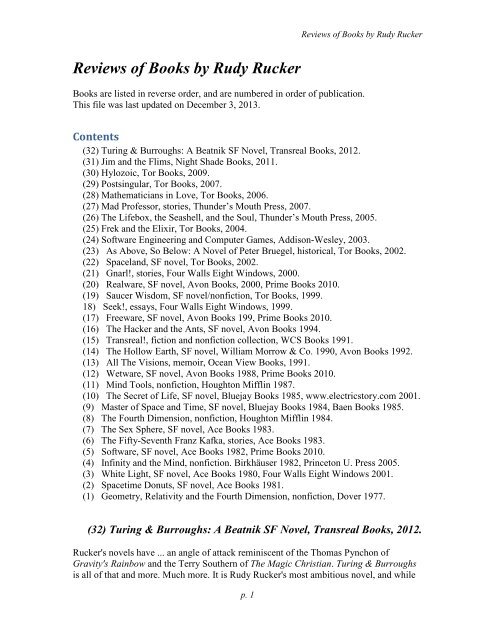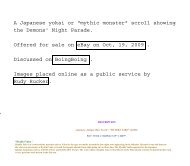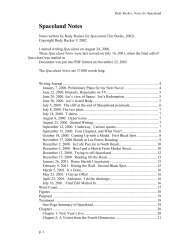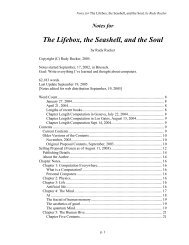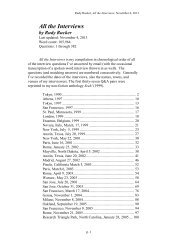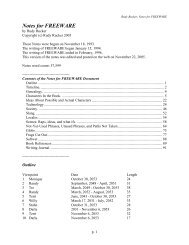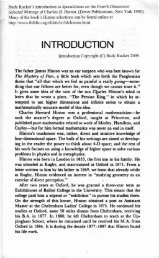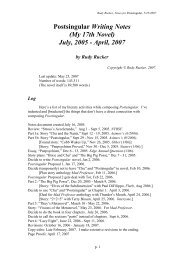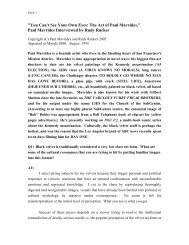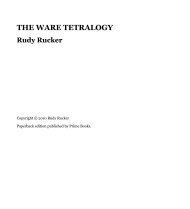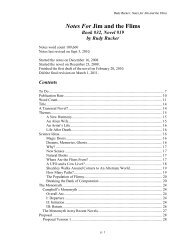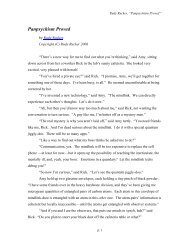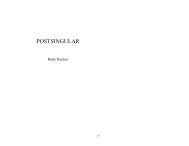Reviews of Books - Rudy Rucker
Reviews of Books - Rudy Rucker
Reviews of Books - Rudy Rucker
You also want an ePaper? Increase the reach of your titles
YUMPU automatically turns print PDFs into web optimized ePapers that Google loves.
<strong>Reviews</strong> <strong>of</strong> <strong>Books</strong> by <strong>Rudy</strong> <strong>Rucker</strong><br />
<strong>Reviews</strong> <strong>of</strong> <strong>Books</strong> by <strong>Rudy</strong> <strong>Rucker</strong><br />
<strong>Books</strong> are listed in reverse order, and are numbered in order <strong>of</strong> publication.<br />
This file was last updated on December 3, 2013.<br />
Contents<br />
(32) Turing & Burroughs: A Beatnik SF Novel, Transreal <strong>Books</strong>, 2012.<br />
(31) Jim and the Flims, Night Shade <strong>Books</strong>, 2011.<br />
(30) Hylozoic, Tor <strong>Books</strong>, 2009.<br />
(29) Postsingular, Tor <strong>Books</strong>, 2007.<br />
(28) Mathematicians in Love, Tor <strong>Books</strong>, 2006.<br />
(27) Mad Pr<strong>of</strong>essor, stories, Thunder’s Mouth Press, 2007.<br />
(26) The Lifebox, the Seashell, and the Soul, Thunder’s Mouth Press, 2005.<br />
(25) Frek and the Elixir, Tor <strong>Books</strong>, 2004.<br />
(24) S<strong>of</strong>tware Engineering and Computer Games, Addison-Wesley, 2003.<br />
(23) As Above, So Below: A Novel <strong>of</strong> Peter Bruegel, historical, Tor <strong>Books</strong>, 2002.<br />
(22) Spaceland, SF novel, Tor <strong>Books</strong>, 2002.<br />
(21) Gnarl!, stories, Four Walls Eight Windows, 2000.<br />
(20) Realware, SF novel, Avon <strong>Books</strong>, 2000, Prime <strong>Books</strong> 2010.<br />
(19) Saucer Wisdom, SF novel/nonfiction, Tor <strong>Books</strong>, 1999.<br />
18) Seek!, essays, Four Walls Eight Windows, 1999.<br />
(17) Freeware, SF novel, Avon <strong>Books</strong> 199, Prime <strong>Books</strong> 2010.<br />
(16) The Hacker and the Ants, SF novel, Avon <strong>Books</strong> 1994.<br />
(15) Transreal!, fiction and nonfiction collection, WCS <strong>Books</strong> 1991.<br />
(14) The Hollow Earth, SF novel, William Morrow & Co. 1990, Avon <strong>Books</strong> 1992.<br />
(13) All The Visions, memoir, Ocean View <strong>Books</strong>, 1991.<br />
(12) Wetware, SF novel, Avon <strong>Books</strong> 1988, Prime <strong>Books</strong> 2010.<br />
(11) Mind Tools, nonfiction, Houghton Mifflin 1987.<br />
(10) The Secret <strong>of</strong> Life, SF novel, Bluejay <strong>Books</strong> 1985, www.electricstory.com 2001.<br />
(9) Master <strong>of</strong> Space and Time, SF novel, Bluejay <strong>Books</strong> 1984, Baen <strong>Books</strong> 1985.<br />
(8) The Fourth Dimension, nonfiction, Houghton Mifflin 1984.<br />
(7) The Sex Sphere, SF novel, Ace <strong>Books</strong> 1983.<br />
(6) The Fifty-Seventh Franz Kafka, stories, Ace <strong>Books</strong> 1983.<br />
(5) S<strong>of</strong>tware, SF novel, Ace <strong>Books</strong> 1982, Prime <strong>Books</strong> 2010.<br />
(4) Infinity and the Mind, nonfiction. Birkhäuser 1982, Princeton U. Press 2005.<br />
(3) White Light, SF novel, Ace <strong>Books</strong> 1980, Four Walls Eight Windows 2001.<br />
(2) Spacetime Donuts, SF novel, Ace <strong>Books</strong> 1981.<br />
(1) Geometry, Relativity and the Fourth Dimension, nonfiction, Dover 1977.<br />
(32) Turing & Burroughs: A Beatnik SF Novel, Transreal <strong>Books</strong>, 2012.<br />
<strong>Rucker</strong>'s novels have ... an angle <strong>of</strong> attack reminiscent <strong>of</strong> the Thomas Pynchon <strong>of</strong><br />
Gravity's Rainbow and the Terry Southern <strong>of</strong> The Magic Christian. Turing & Burroughs<br />
is all <strong>of</strong> that and more. Much more. It is <strong>Rudy</strong> <strong>Rucker</strong>'s most ambitious novel, and while<br />
p. 1
<strong>Reviews</strong> <strong>of</strong> <strong>Books</strong> by <strong>Rudy</strong> <strong>Rucker</strong><br />
perhaps not a perfect success, it is a success. ... <strong>Rucker</strong> being <strong>Rucker</strong>, the central story<br />
line is not even half the bizarre, fascinating, scientific, sexual, and historical content <strong>of</strong><br />
this delightfully humorous yet somehow thematically serious novel.<br />
--- Norman Spinrad, review in Asimov's SF Magazine<br />
<strong>Rucker</strong> accomplishes a significant feat by mashing up Greg Bear-level speculations with<br />
a kind <strong>of</strong> On the Road vibe, full <strong>of</strong> slang-laden hipster contempt for the Establishment<br />
and a desire to break free <strong>of</strong> stifling conventions. … The Eisenhower-era conformity and<br />
general societal suspicion <strong>of</strong> weirdos is a perfect adventure matrix for these ultimate<br />
outsiders: chimeric, telepathic slugs.<br />
--- Paul Di Filippo, review in Locus Online<br />
<strong>Rucker</strong>’s “Beatnik SF Novel” deftly combines historic characters and wild flights <strong>of</strong><br />
imagination in a spin-<strong>of</strong>f <strong>of</strong> our world’s history. … <strong>Rudy</strong> <strong>Rucker</strong> has produced an SFnal<br />
tour de force. … The prose in Turing & Burroughs can flow like a drug-stoked dream.<br />
--- Faren Miller, review in Locus Magazine<br />
A delightful alternative history romp set in the middle <strong>of</strong> the 1950s. <strong>Rucker</strong> immerses<br />
the reader in the beat milieu, with the added twist that here they really are pod people,<br />
and loving it. … This novel engages the reader to such an extent that it's easy to overlook<br />
the extensive research that went into making it authentic, not just superficially, but in<br />
depth.<br />
--- John Walker, review in Fourmilog.<br />
(31) Jim and the Flims, Night Shade <strong>Books</strong>, 2011.<br />
Jim and the Flims <strong>of</strong>fers <strong>Rucker</strong>’s delightfully eccentric and transrealist approach to what<br />
turns out to be a kind <strong>of</strong> modern-day Orpheus tale. It’s <strong>of</strong>ten silly and lighthearted, but<br />
it’s buoyed by the emotional weight <strong>of</strong> Jim’s quest, and also by the <strong>of</strong>ten beautiful and<br />
moving view <strong>of</strong> life and death. And I can guarantee that it’s probably not at all like<br />
anything else you’re going to read this summer.<br />
—Karin L. Kross, review in Tor.com<br />
I love <strong>Rudy</strong> <strong>Rucker</strong>. The guy is simply incomparable when it comes to writing science<br />
fiction, managing to seamlessly blend highly intelligent existential and scientific<br />
speculation with wildly satirical and insanely imaginative plotlines...You can imagine my<br />
delight when a copy <strong>of</strong> his newest release, Jim and the Flims, landed on my doorstep. In<br />
this novel, <strong>Rucker</strong> reimagines the myth <strong>of</strong> Orpheus as only he can – Jim Oster is a former<br />
surfer dude, part-time stoner, and current Santa Cruz mailman who dabbles in high-tech<br />
research.<br />
—Paul Goat Allen, review on Barnes & Noble Bookclub<br />
p. 2
<strong>Reviews</strong> <strong>of</strong> <strong>Books</strong> by <strong>Rudy</strong> <strong>Rucker</strong><br />
Jim and the Flims...<strong>Rudy</strong> <strong>Rucker</strong>'s weirdest, craziest, colorfulest book yet? That's saying<br />
a lot, I know. But when it is at its most bizarre, it is also most hilarious. Nobody else<br />
writes like <strong>Rudy</strong><br />
—Marc Laidlaw, author <strong>of</strong> Kalifornia<br />
(30) Hylozoic, Tor <strong>Books</strong>, 2009.<br />
<strong>Rucker</strong>’s yarn <strong>of</strong> a future where everything—animals, rocks, the planet Earth—is<br />
conscious, telepathic and <strong>of</strong>ten irrepressibly chatty. <strong>Rucker</strong>’s approach takes a highcomic<br />
trajectory with a satirical edge... Serious, uproarious fun, with brain-teasers and<br />
brilliant ideas tossed about like confetti.<br />
— Kirkus <strong>Reviews</strong>.<br />
Bristling with cool ideas, bizarre but witty formulations and neologisms, Carrollian<br />
mathematical/logic puzzles, gnarly tech applications and gonzo speculations, wicked<br />
satire, hot sex, nasty aliens, anarchic plots, and psi powers ... <strong>Rucker</strong> juggles the<br />
disparate elements <strong>of</strong> his plot with the zany aplomb <strong>of</strong> the Flying Karamazov Brothers.<br />
His vision <strong>of</strong> the future is a hopeful and inclusive one—and one hell <strong>of</strong> a party.<br />
— Locus<br />
Hylozoic goes much further into the realms <strong>of</strong> the twisted, the disturbing and the posteverything.<br />
... The whole thing gets more and more demented, until it almost feels like<br />
you need a post-singularity brain to understand all <strong>of</strong> the eigth-dimensional drama and<br />
weirdness. But just when you think <strong>Rucker</strong>'s layered on too much ... for one book, it<br />
reveals itself, once again, to be the story <strong>of</strong> JayJay and Thuy's marriage, and <strong>of</strong> their<br />
battle to stay married in the face <strong>of</strong> alien birds, addictive manta-ray gel, and a<br />
personality-eating world mind.<br />
— io9<br />
(29) Postsingular, Tor <strong>Books</strong>, 2007.<br />
Alt-cultural folk strive to save Earth from digitized doom in this novel from the prince <strong>of</strong><br />
gonzo SF. A computer mogul's threat to replace messy reality with clean virtuality and by<br />
a memory-hungry artificial intelligence called the Big Pig propels nanotechnologist Ond<br />
Lutter, his autistic son, Chu, and their allies on an interdimensional quest for a golden<br />
harp, the Lost Chord, strung with hypertubes that can unroll the eighth dimension and<br />
unleash limitless computing power. ... <strong>Rucker</strong> favors the flower power <strong>of</strong> San Francisco<br />
over the number crunching <strong>of</strong> Silicon Valley. His novel vibrates with the warm rhythms<br />
<strong>of</strong> dream and imagination, not the cold logic <strong>of</strong> programming ... Playing with the math <strong>of</strong><br />
quantum computing, encryption and virtual reality, <strong>Rucker</strong> places his faith in people who<br />
find true reality "gnarly" enough to love.<br />
— Publisher's Weekly (C) Reed Business Information.<br />
Always willing and able to embrace sf's trendiest themes, <strong>Rucker</strong> here takes on the<br />
volatile field <strong>of</strong> nanotechnology and the presumed inevitable "singularity" <strong>of</strong> human and<br />
computer unification. In a series <strong>of</strong> interrelated vignettes, he describes the calamity that<br />
p. 3
<strong>Reviews</strong> <strong>of</strong> <strong>Books</strong> by <strong>Rudy</strong> <strong>Rucker</strong><br />
befalls nanotech inventor Ond Lutter and his would-be benefactors when Ond unleashes a<br />
variety <strong>of</strong> self-replicating nanobots. In one episode, trillions <strong>of</strong> microscopic bots, dubbed<br />
nants, chew up Mars to create a colossal Dyson Sphere orbiting the sun. When the nants<br />
move on to Earth to transform every living being into a virtual-reality doppelganger, Ond<br />
saves the day with a nant-busting virus. The real fun begins, however, when Ond<br />
"improves" on the nants with apparently benign nanobots, called orphids, that blanket<br />
every surface and provide plugged-in users three-dimensional access to every<br />
conceivable scrap <strong>of</strong> knowledge and experience. ... His devoted fans and dazzled<br />
newcomers to him will revel in his willingness to push technological extrapolation to its<br />
soaring limits.<br />
— Carl Hays, Booklist<br />
When it comes to unique voices in science fiction, few can claim to have quite as<br />
distinctive a style as <strong>Rudy</strong> <strong>Rucker</strong>. Postsingular is packed full <strong>of</strong> the larger-than-life<br />
weirdness that has become his trademark; classic genre tropes and clichés rub shoulders<br />
with mathematical theorems and wild technological speculation, delivered in prose that<br />
captures the the languid vibe and hippie undercurrents <strong>of</strong> California. ... <strong>Rucker</strong>'s quickdraw<br />
style acts as a sleight-<strong>of</strong>-hand that allows him to slip some <strong>of</strong> sf's biggest tropes and<br />
ideas beneath the reader's radar, as well as touching some very human character aspects<br />
that are <strong>of</strong>ten skipped over (or, worse still, rendered tiresome) by the pens <strong>of</strong> others.<br />
Postsingular has all the bells and whistles that only a computing pr<strong>of</strong>essor could provide,<br />
but never at the expense <strong>of</strong> the story.<br />
—Paul Raven, Interzone<br />
<strong>Rudy</strong> <strong>Rucker</strong>'s new novel Postsingular is pure <strong>Rucker</strong>: a dope-addled exploration <strong>of</strong> the<br />
way-out fringes <strong>of</strong> string theory and the quantum universe that distorts the possible into<br />
the most improbable contortions... A kick-ass, weird-ass post-cyberpunk novel...This is<br />
one <strong>of</strong> the most fun, strangest, most thought-provoking sf novels I've read.<br />
—Cory Doctorow, BoingBoing and BoingBoing (two reviews)<br />
This book is densely written...yet also captivatingly plotted for sheer narrative verve and<br />
laced with plenty <strong>of</strong> humor and suspense. Walking a tightrope between information<br />
overload and thriller action, the book captures the heady zip, zest and buzz <strong>of</strong> the postsingular<br />
milieu, a world where miracles are commonplace but structured logically to<br />
provide real challenges, risks and triumphs.<br />
—Paul DiFilippo, SciFi.com<br />
<strong>Rucker</strong> writes with a hyperactive level <strong>of</strong> inventiveness that seems to owe bits in equal<br />
measure to Lewis Carroll, William Burroughs, and Ray Kurzweil. <strong>Rucker</strong> can be<br />
enormous fun to read, and there are some stunningly bold ideas here.<br />
—Gary K. Wolfe, Locus<br />
Any true singularity pretty much by definition has to be so over-the-top that it would stun<br />
present-day minds. This is over-the-top as only <strong>Rudy</strong> <strong>Rucker</strong> can do it.<br />
—Tom Easton, Analog<br />
p. 4
<strong>Reviews</strong> <strong>of</strong> <strong>Books</strong> by <strong>Rudy</strong> <strong>Rucker</strong><br />
It's fast-paced and subversive: nanomachines dismantle all life on Earth and send<br />
everyone to a virtual world, and you're still only on page 20. Postsingular turns the<br />
singularity, the mythical moment when we all transcend our humanity and become<br />
cyberer, into something much weirder and more ambivalent. Just as other cyberfiction is<br />
becoming more cautious in its predictions, <strong>Rucker</strong> takes wilder and wilder leaps into<br />
outer possibility.<br />
—Charlie Jane Anders, San Francisco Bay Guardian<br />
Postsingular is hugely enjoyable. It's never boring, and never gets bogged down in<br />
difficult info-dumps. <strong>Rucker</strong>'s ideas are simple and elegant, despite the complex thinking<br />
behind them shown in his working notes. Exotic concepts such as shoons, orhipds, beezie<br />
and a universe 1.8 Planck lengths away in another dimension all seem natural and logical<br />
without the need for dense scientification to justify them. Highly recommended, and<br />
when you're done take a look at the working notes for further insight into <strong>Rucker</strong>'s ideas<br />
and inspirations.<br />
—Patrick Hudson, The Zone<br />
<strong>Rudy</strong> <strong>Rucker</strong> is well-loved for tons <strong>of</strong> things, but I am totally in love with his characters.<br />
Not since Philip K. Dick has there been an author more able to drill down to what exactly<br />
makes us human and expose it for everyone to see. Postsingular—which deals mostly<br />
with society’s total, overnight change and the people who get mixed up in it—has an<br />
unbelievably awesome, unbelievably human cast <strong>of</strong> characters, from the dumpy scientist<br />
to his autistic genius son, to the street kids who have huge dreams and small ambition.<br />
Every word <strong>of</strong> dialogue is pitch-perfect, and along with a fairly adventurous<br />
interdimensional plot, Postsingular is my favorite <strong>Rucker</strong> book in years.<br />
—Ryun Patterson, Bookgasm Best Sci-Fi <strong>Books</strong> <strong>of</strong> 2007<br />
(28) Mathematicians in Love, Tor <strong>Books</strong>, 2006.<br />
<strong>Rucker</strong> cleverly pulls <strong>of</strong>f a romantic comedy about mathematicians in love. This<br />
excursion into alternative versions <strong>of</strong> Berkeley, Calif., is full <strong>of</strong> quirky, charming lifeforms<br />
human and otherwise and ruled by a god who’s the female jellyfish-creator <strong>of</strong><br />
Earth. All this seethes around Bela Kis; Bela’s roommate, Paul Bridge; and Bela’s<br />
girlfriend, Alma Ziff, who ping-pongs between them in a sometimes acute, sometimes<br />
obtuse love triangle. Bela and Paul struggle for their Ph.D.s under mad math genius<br />
Roland Haut by inventing a paracomputer “Gobubble” that predicts future events. ...<br />
<strong>Rucker</strong>’s wild characters, <strong>of</strong>f-the-wall situations and wicked political riffs prove that<br />
writing SF spo<strong>of</strong>s, like Bela’s rock music avocation, “beats the hell out <strong>of</strong> publishing a<br />
math paper.”<br />
— Publisher’s Weekly<br />
In Mathematicians in Love <strong>Rucker</strong> has created a love story wrapped up in a cross-cultural<br />
mystery tour that could only have happened inside the mind <strong>of</strong> a crazy mathemetician.<br />
Buy a ticket. It’s well worth the price. It allows you to immerse yourself in math lingo as<br />
p. 5
<strong>Reviews</strong> <strong>of</strong> <strong>Books</strong> by <strong>Rudy</strong> <strong>Rucker</strong><br />
cool and arcane as anything jazz musicians could come up with and feel knowledgeable,<br />
even though it’s all so much mumbo jumbo. Somehow, when <strong>Rucker</strong>’s characters talk<br />
about the nature <strong>of</strong> the universe (or the curve <strong>of</strong> a yellow bikini) in terms <strong>of</strong> fractals,<br />
curved planes and number theory, it all seems totally, intense, relevant and hip. Which<br />
would be a pretty good description <strong>of</strong> the author.<br />
— SFRevu<br />
<strong>Rucker</strong> ... is palpably and quiveringly tuned in to the zeitgeist and can <strong>of</strong>fer cultural and<br />
scientific commentary and satire better than almost any other SF author practicing today.<br />
And if, as some have it, SF always speaks <strong>of</strong> the present, no matter what era it’s set in,<br />
then <strong>Rucker</strong> has just cut straight to the chase this time, nevertheless retaining all the<br />
glorious weirdness that comes with more futuristic milieus.<br />
— SciFi.com<br />
Mathematicians in Love ... percolates with <strong>of</strong>f-the-wall characters and trippy extradimensional<br />
shenanigans. Nobody writes math-based science fiction like <strong>Rudy</strong> <strong>Rucker</strong><br />
does. He keeps the tone light and the action playful, even as his characters grapple with<br />
the meaning <strong>of</strong> tragedy and the ultimate mechanics <strong>of</strong> the universe. A definite high point<br />
in <strong>Rucker</strong>’s singular writing career.<br />
— San Francisco Chronicle<br />
All the pleasures <strong>of</strong> a <strong>Rucker</strong> novel come forth abundantly: playfully weird higher<br />
physics and math; bizarre conceptual psychedelia; distincively Calfornian countercultural<br />
comedy; zany romance; doppelgangers; generally happy endings. ...<br />
Mathematicians in Love is an engaging and entertaining book, light yet thoughtprovoking,<br />
funny yet <strong>of</strong> some gravity. It deserves success.<br />
— Locus<br />
<strong>Rudy</strong> <strong>Rucker</strong> should be declared a National Treasure <strong>of</strong> American Science Fiction.<br />
Someone simultaneously channeling Kurt Gödel and Lenny Bruce might start to<br />
approximate full-on <strong>Rucker</strong>ian warp-space, but without the sweet, human, splendidly<br />
go<strong>of</strong>y <strong>Rudy</strong>-ness at the core <strong>of</strong> the singularity.<br />
— William Gibson, author <strong>of</strong> Pattern Recognition<br />
What a Dickensian genius <strong>Rucker</strong> has for Californian characters, as if, say, Dickens had<br />
fused with Phil Dick and taken up surfing and jamming and topologising. He has a<br />
hotline to cosmic revelations yet he’s always here and now in the groove, tossing <strong>of</strong>f lines<br />
<strong>of</strong> beauty and comic wisdom. ‘My heart is a dog running after every cat.’ We really feel<br />
with his characters in their bizarre tragicomic quests.<br />
— Ian Watson, author <strong>of</strong> The Great Escape<br />
<strong>Rudy</strong> <strong>Rucker</strong> is the most consistently brilliant imagination working in SF today<br />
— Charles Stross, author <strong>of</strong> Accelerando<br />
p. 6
<strong>Reviews</strong> <strong>of</strong> <strong>Books</strong> by <strong>Rudy</strong> <strong>Rucker</strong><br />
For sheer gonzo inventiveness, trust <strong>Rucker</strong> and this gut-wrenching, near-ftl-speed<br />
intellectual adventure. And trust me, too: You won’t read another sf work all year this<br />
much mind-bending, synapse-tingling fun.<br />
— Michael Bishop, author <strong>of</strong> Philip K. Dick Is Dead, Alas<br />
This may well be <strong>Rudy</strong> <strong>Rucker</strong>’s best novel — funny, wise, fast and inventive. A real<br />
advance.<br />
— Gregory Benford, author <strong>of</strong> The Sunborn<br />
<strong>Rudy</strong> <strong>Rucker</strong> writes like the love child <strong>of</strong> Philip K. Dick and George Carlin. Brilliant,<br />
frantic, conceptual, cosmological . . . like lucid dreaming, only funny. This book rocks!<br />
—Walter John Williams, author <strong>of</strong> Dread Empire’s Fall<br />
<strong>Rudy</strong> <strong>Rucker</strong> never fails to leave me breathless. . . Reading one <strong>of</strong> his stories is like a<br />
reset button on reality: when it’s over, the whole universe looks slightly different...and<br />
much stranger.<br />
—Spider Robinson, author <strong>of</strong> Night <strong>of</strong> Power<br />
(27) Mad Pr<strong>of</strong>essor, stories, Thunder’s Mouth Press, 2007.<br />
Much cyberpunk SF is grimly noir in depicting future-shocked people trapped by their<br />
limitations, but in this collection <strong>of</strong> 19 laid-back yarns, <strong>Rucker</strong> (Mathematicians in Love)<br />
finds human dilemmas much too important to take seriously. "Jenna and Me," for<br />
example, co-written with his son <strong>Rudy</strong> <strong>Rucker</strong> Jr., shows President Bush's daughter<br />
brain-wiped by agents <strong>of</strong> the "conspiracy elite," but eventually becoming the unwitting<br />
focus for an alien invasion that may remake humanity for the better. "Junk DNA," a<br />
collaboration with Bruce Sterling, depicts the accidental benefits <strong>of</strong> unprincipled<br />
commercial exploitation <strong>of</strong> bioscience. Other stories emphasize extreme physical<br />
transformation, positive or negative results <strong>of</strong> thought experiments, and cheerful<br />
horniness. While readers who want rigorously developed plots or characterization may be<br />
disappointed, those who can groove on something like a collaboration between Italo<br />
Calvino and Jimmy Buffett will find themselves grinning and humming along.<br />
—Publishers Weekly, Copyright © Reed Business Information.<br />
Often cited as one <strong>of</strong> the original cyberpunk pioneers, <strong>Rucker</strong> has channeled his<br />
groundbreaking ideas and yen for mathematics into almost 30 volumes <strong>of</strong> fiction and<br />
cerebral nonfiction over as many years. His latest book <strong>of</strong> stories finds him in fine form,<br />
extrapolating number theory into madcap tales about quantum elves and lotto-playing<br />
programmers. Five <strong>of</strong> the 13 pieces are collaborations with other notable sf veterans, such<br />
as Bruce Sterling and John Shirley. In "2+2=5," written with Terry Bisson, two nursing<br />
home-bound seniors zero in on breaking the world counting record. "Cobb Wakes Up"<br />
recounts the fate <strong>of</strong> a long-dead robot inventor resurrected as a conscious computer<br />
program. In perhaps the volume's most satirical entry, "The Men in the Backroom at the<br />
Country Club," aliens infiltrate <strong>Rucker</strong>'s former home base <strong>of</strong> Lynchburg, Virginia, and<br />
p. 7
<strong>Reviews</strong> <strong>of</strong> <strong>Books</strong> by <strong>Rudy</strong> <strong>Rucker</strong><br />
meet their unlikely nemesis in the form <strong>of</strong> the town's religious zealots. A delight for both<br />
<strong>Rucker</strong> devotees and sf fans who prefer that their fiction be a little zany.<br />
—Carl Hays, Booklist, Copyright © American Library Association.<br />
In his introduction to Mad Pr<strong>of</strong>essor, <strong>Rucker</strong> cites four factors that spawn his stories:<br />
thought experiments, power chords, gnarliness and wit. In other words, <strong>Rucker</strong> isn't just a<br />
hard-core science geek but a true-blue Californian. In fact, it's almost impossible to read a<br />
<strong>Rucker</strong> book without encountering the word "gnarly." One component unmentioned here<br />
is the <strong>Rucker</strong>-styled "transrealism," a form <strong>of</strong> poetic realism in which <strong>Rucker</strong> draws upon<br />
personal experience, melding this with a speculative fiction-plot staple, such as time<br />
travel or a parallel universe. This generates, by way <strong>of</strong> the weld, symbolic and <strong>of</strong>ten<br />
perceptive narratives sometimes atoning for genre implausibilities. ... It's not all as<br />
preposterous as it seems, in part because <strong>Rucker</strong>'s enthusiasm is infectious. He is an<br />
author determined to entertain by any means necessary.<br />
—Edward Champion, Los Angeles Times.<br />
<strong>Rucker</strong> stands alone in the science fiction pantheon as some kind <strong>of</strong> trickster god <strong>of</strong> the<br />
computer science lab; where others construct minutely plausible fictional realities, he<br />
simply grabs the corners <strong>of</strong> the one we already know and twists it in directions we don't<br />
have pronounceable names for. ... Within the scope <strong>of</strong> the logical system he has built for<br />
his work, he is a peerless genius — a mad pr<strong>of</strong>essor, in fact.<br />
—Paul Raven, SF Site.<br />
(26) The Lifebox, the Seashell, and the Soul, Thunder’s Mouth Press,<br />
2005.<br />
A key debate <strong>of</strong> the computer revolution concerns Stephen Wolfram’s argument that<br />
everything is equivalent to computation; this book explores the implications <strong>of</strong> that<br />
thought. <strong>Rucker</strong> modifies Wolfram’s basic premises to apply to everyday experience —<br />
ending with a half-dozen practical rules for attaining happiness. Charmingly written and<br />
thought-provoking.<br />
— Kirkus <strong>Reviews</strong><br />
Lifebox is valuable in the same way a wide-ranging philosophical classic like The<br />
Republic is valuable. To read it is to peer through a conceptual lens with its own unique<br />
focal length -- an act that allows us to see the world in a way we never glimpsed it before.<br />
... <strong>Rucker</strong>’s stylistic approach, featuring bite-size sci-fi stories that illustrate his points, is<br />
so innovative that even non-techies will find themselves enjoying the ride.<br />
— San Francisco Chronicle<br />
<strong>Rudy</strong> <strong>Rucker</strong> is an outstanding prophet <strong>of</strong> what will probably be the greatest intellectual<br />
revolution <strong>of</strong> our times. This book tells the ever-surprising story <strong>of</strong> his transformation as<br />
he discovers the wonders <strong>of</strong> the computational universe, and grapples with their<br />
implications for humanity’s oldest questions. For people who thrive on new ideas, this<br />
book will be a classic.<br />
p. 8
<strong>Reviews</strong> <strong>of</strong> <strong>Books</strong> by <strong>Rudy</strong> <strong>Rucker</strong><br />
— Stephen Wolfram, author <strong>of</strong> A New Kind <strong>of</strong> Science.<br />
This is the Big Book I wish everyone would do. Audacious and simply inimitable. You<br />
are inside <strong>Rudy</strong> <strong>Rucker</strong> by the end. Nobody takes the late-night idea that the universe is a<br />
computer as seriously (or with as much fun) as this book does. What I love about it: it’s<br />
part biography, part far-out science fiction speculation, part best course-in-computationever-taught,<br />
part romp through the intellectual frontiers <strong>of</strong> mathematics and philosophy,<br />
part sage wisdom, part blog, part graduate student thesis, part genius. What it might<br />
become: a new Gödel, Escher, <strong>Rucker</strong>.<br />
— Kevin Kelly, Wired editor.<br />
Computation, pattern, and information are hot topics these days as they find increasing<br />
applications in science, pure mathematics, computing, and even philosophy. Dr. <strong>Rudy</strong><br />
<strong>Rucker</strong>, long at the center <strong>of</strong> this cyclone, has produced a truly stunning survey <strong>of</strong> their<br />
manifold consequences. No one should pass up the experience <strong>of</strong> stepping through the<br />
portals <strong>of</strong> this beautiful book into fantastic new worlds — and topics ranging from brains<br />
and robots to hive minds and quantum souls.<br />
— Cliff Pickover, author <strong>of</strong> A Passion for Mathematics.<br />
All the world’s a computation,<br />
And all the men and women (and everything else) merely operands.<br />
With the soul <strong>of</strong> a poet and the insight <strong>of</strong> a logician, <strong>Rudy</strong> <strong>Rucker</strong> dramatizes the story <strong>of</strong><br />
one <strong>of</strong> the most transforming ideas in modern science: that <strong>of</strong> computation. Interpreting<br />
the notion oh so broadly, <strong>Rucker</strong> calls on his impressive background in computer science<br />
and science fiction to clarify, amplify, and vivify a whole complex <strong>of</strong> seminal concepts.<br />
And the book’s fun to read too!<br />
— John Allen Paulos, author <strong>of</strong> Innumeracy and Once Upon a Number<br />
How did a universe composed <strong>of</strong> just a few kinds <strong>of</strong> absolutely identical particles,<br />
starting from a state <strong>of</strong> almost complete uniformity, evolve in an ever ascending chain <strong>of</strong><br />
complexity to produce galaxies, stars, planets, life, intelligence, and culture? In this<br />
fascinating book, <strong>Rudy</strong> <strong>Rucker</strong> explores how structures in nature, human consciousness,<br />
and society may actually be computations, showing how extremely simple computer<br />
programs manifest complex emergent behavior which mimics natural phenomena,<br />
suggesting that computer science may become part <strong>of</strong> the foundation <strong>of</strong> the sciences <strong>of</strong><br />
the twenty-first century.<br />
— John Walker, co-founder <strong>of</strong> Autodesk, Inc.<br />
In this immense and ambitious work, former computer science pr<strong>of</strong>essor <strong>Rucker</strong> (The<br />
Fourth Dimension) speculates that life is a computation. He <strong>of</strong>fers examples <strong>of</strong> everyday<br />
activities that are computational processes-speech, agriculture, hunting-as well as<br />
instances <strong>of</strong> computations found in nature and attempts to model those computations<br />
using cellular automata. He applies this view <strong>of</strong> life as computation to problems in<br />
physics and biology (e.g., DNA and genetic reproduction) and goes on to explore<br />
artificial intelligence and the application <strong>of</strong> computation to questions <strong>of</strong> society. The<br />
“lifebox” in the title is a digital copy <strong>of</strong> a person’s memory that would be hyperlinked<br />
p. 9
<strong>Reviews</strong> <strong>of</strong> <strong>Books</strong> by <strong>Rudy</strong> <strong>Rucker</strong><br />
and “give a reasonably good impression <strong>of</strong> having a conversation with you.” Though<br />
<strong>Rucker</strong> ultimately sees the world as beyond computation, he convincingly argues that the<br />
computational view can shed perspective on reality. Including many examples from the<br />
history <strong>of</strong> computing, this dense and challenging read is recommended for science<br />
collections in larger public and academic libraries.<br />
— Library Journal (Garrett Eastman, Rowland Inst. at Harvard Univ.)<br />
<strong>Rucker</strong> ... is reaching as high as he can to try to use available computer science and math<br />
metaphors to create a new, comprehensive, multidisciplinary sensibility. The <strong>Rucker</strong>ian<br />
future is one in which new guiding explanatory ideas will connect all areas <strong>of</strong> intellectual<br />
curiosity.<br />
— Jaron Lanier in American Scientist<br />
(25) Frek and the Elixir, Tor <strong>Books</strong>, 2004.<br />
With this book, <strong>Rudy</strong> <strong>Rucker</strong> seems to have boldly ascended a new peak in his career.<br />
Frek is utterly believable and empathy-inducing from the first page <strong>of</strong> the tale. Frek<br />
remains both a conquering hero and a 12-year-old boy, showing us that we all may<br />
contain avatars bigger than our shells. This book is Robert Heinlein’s Have Spacesuit —<br />
Will Travel with the vacuum tubes replaced by wetware and all the knobs turned up to 11.<br />
— SF Site<br />
Completely delightful and amusing. A great adventure in a book that is an enormous<br />
amount <strong>of</strong> fun and full <strong>of</strong> charms that will appeal to readers <strong>of</strong> all ages from about 12 up.<br />
Frek and the Elixir may happily become something to read for the millions <strong>of</strong> fans who<br />
are waiting for Harry Potter Six.<br />
— San Jose Mercury News<br />
<strong>Rucker</strong> posesses a wild, unfettered imagination, and he uses concepts from string theory<br />
and quantum mechanics to power this wide-ranging, almost psychedelic yarn. Fresh,<br />
funny and frequently mind-boggling.<br />
— San Francisco Chronicle<br />
<strong>Rucker</strong> has a clarity <strong>of</strong> purpose: to entertain with intelligence.<br />
— Kansas City Star<br />
<strong>Rucker</strong> successfully combines sharp-edged satire with old-fashioned pulp sensibilities to<br />
create a frantic tale <strong>of</strong> dirty double-dealing and high adventure. Readers in search <strong>of</strong><br />
something different need look no further than this droll saga <strong>of</strong> the future.<br />
—Publishers Weekly<br />
Imagine Frodo Baggins as a 31st-century human kid in a transformed Earth where bioengineering<br />
and consumerism have run amok... Frek’s grand adventures will leave you<br />
simultaneously enlightened, awestruck, dazed, and amused — “<strong>Rucker</strong>ized,” you might<br />
call it — by an author working at the height <strong>of</strong> his powers.<br />
p. 10
<strong>Reviews</strong> <strong>of</strong> <strong>Books</strong> by <strong>Rudy</strong> <strong>Rucker</strong><br />
—Locus<br />
Frek and the Elixir is perhaps <strong>Rucker</strong>’s best book, containing as it does such a wealth <strong>of</strong><br />
material in a compelling story. In some ways, <strong>Rucker</strong> is a literary descendant <strong>of</strong> Philip K.<br />
Dick, and this book felt to me like the masterpiece <strong>of</strong> trashy culture, ordinary people, and<br />
wacked-out ideas that Dick never quite wrote.<br />
—Challenging Destiny<br />
Before you can say “E.T.” or “A Wrinkle In Time,” Frek and some very odd companions<br />
are <strong>of</strong>f on an escapade that will span space, time and numerous other dimensions ... a<br />
magical mystery tour <strong>of</strong> the universe according to string theory.<br />
—New York Times<br />
(24) S<strong>of</strong>tware Engineering and Computer Games, Addison-Wesley, 2003.<br />
(23) As Above, So Below: A Novel <strong>of</strong> Peter Bruegel, historical, Tor<br />
<strong>Books</strong>, 2002.<br />
A delightful book, one that carries us through the sixteenth-century picture-plane at<br />
extraordinary angles, illuminating Bruegel, his art and his world, with warmth and<br />
candor.<br />
— William Gibson, author <strong>of</strong> Pattern Recognition<br />
<strong>Rucker</strong> manages the delicate trick <strong>of</strong> making his tale both exotically foreign in time and<br />
space yet resonant with the present day. Much <strong>of</strong> <strong>Rucker</strong>’s success stems from his<br />
obvious identification with his subject. Given a relative paucity <strong>of</strong> solid historical data<br />
about Bruegel, <strong>Rucker</strong> is able to reverse-engineer the man from his paintings, and the<br />
result is a visionary artist who embodies <strong>Rucker</strong>’s own dichotomous concern with the<br />
matters both <strong>of</strong> dirty earth and <strong>of</strong> numinous heaven.”<br />
— Isaac Asimov’s SF Magazine<br />
What possesses a popular science fiction writer to write a historical novel about a<br />
sixteenth-century Flemish painter enamored <strong>of</strong> peasant ways? Unbridled fascination with<br />
the depiction <strong>of</strong> worlds real and imagined. <strong>Rucker</strong>’s keen insights into Peter Bruegel’s<br />
spellbinding and politically subversive work underpin this animated, suspenseful, and<br />
affecting tale, a step up from Tracy Chevalier’s Girl with a Pearl Earring (2000).<br />
Biographical information about Bruegel is scant, but <strong>Rucker</strong>’s sense that the painter was<br />
lively, compassionate, courageous, and determined feels right, and the characters <strong>Rucker</strong><br />
invents to flesh out Bruegel’s violent and precarious universe are equally compelling,<br />
especially the cultured mapmaker Abraham Ortelius, who is so careful to conceal his<br />
homosexuality; the sexy and volatile half-Native American, Williblad Cheroo, and<br />
Bruegel’s smart, saucy wife. Just as Bruegel’s paintings are a great joy to behold even as<br />
they induce the viewer to face the grimmer aspects <strong>of</strong> life, <strong>Rucker</strong>’s vivid imagining <strong>of</strong><br />
Bruegel’s trials and triumphs is set against a cutting indictment <strong>of</strong> the horrors <strong>of</strong> the<br />
p. 11
<strong>Reviews</strong> <strong>of</strong> <strong>Books</strong> by <strong>Rudy</strong> <strong>Rucker</strong><br />
Spanish occupation and Inquisition. Bruegel’s great gift was his perception <strong>of</strong> the sacred<br />
in the earthy, and <strong>Rucker</strong> follows suit in this vital portrait <strong>of</strong> a sweet-natured disciple <strong>of</strong><br />
life’s fecund beauty in a time <strong>of</strong> cold-blooded tyranny.<br />
— Book List<br />
Pictures at an exhibition, sort <strong>of</strong>, as mathematician and SF writer <strong>Rucker</strong> tells the life <strong>of</strong><br />
the great Flemish painter. ... Here we follow Bruegel’s story from 1552 to 1569 in sixteen<br />
chapters that organize themselves around sixteen <strong>of</strong> the master’s best-known paintings.<br />
... A lively and well-narrated tale that will appeal to Bruegel fans and may awaken<br />
newcomers to an interest in his work.”<br />
— Kirkus <strong>Reviews</strong><br />
As intricate ... as one <strong>of</strong> its subject’s own vivid depictions <strong>of</strong> 16th-century life in the<br />
Spanish-dominated Low Countries, <strong>Rucker</strong>’s fictionalized life <strong>of</strong> Bruegel draws its<br />
readers into a teeming world <strong>of</strong> politics, art, love, sin and loss. ... This is clearly a labor <strong>of</strong><br />
love and ... it grapples handily with Bruegel’s genius — his ability to wittily and<br />
gracefully recreate all human activity, from the sublime to the scatological.”<br />
— Publisher’s Weekly<br />
(22) Spaceland, SF novel, Tor <strong>Books</strong>, 2002.<br />
Speculative fiction based on mathematics, rather than the physical sciences, is a rare<br />
commodity. Edward Abbot’s turn-<strong>of</strong>-the-century, geometric fantasy “Flatland” is<br />
recognized as one <strong>of</strong> the classics <strong>of</strong> the genre. <strong>Rudy</strong> <strong>Rucker</strong> has fashioned an engaging<br />
homage to it in Spaceland. <strong>Rucker</strong> is one <strong>of</strong> the genre’s most reliable humorists, and he<br />
packs Spaceland with plenty <strong>of</strong> wry observations and loopy scenarios. Even if you<br />
couldn’t handle college algebra, Spaceland provides more than its fair hare <strong>of</strong> mindbending<br />
fun.<br />
— San Francisco Chronicle.<br />
Spaceland puts the hyper into hyperspace and the high into higher dimensions. A fastpaced<br />
tribute to the classic Flatland that challenges all <strong>of</strong> our comfortable assumptions<br />
about the world we inhabit.<br />
— Ian Stewart, author <strong>of</strong> Flatterland and The Annotated Flatland.<br />
<strong>Books</strong> on higher dimensions with such beauty, breadth, and insight are rare. Dr. <strong>Rucker</strong>’s<br />
Spaceland is chock full <strong>of</strong> mind-boggling images and ideas. The eclectic <strong>Rucker</strong> is both a<br />
mathematician and science-fiction guru, and with the cold logic <strong>of</strong> the one and the<br />
inspired vision <strong>of</strong> the other, he covers an array <strong>of</strong> topics sure to stimulate your<br />
imagination and sense <strong>of</strong> wonder at the incredible vastness <strong>of</strong> our mathematical universe.<br />
— Clifford Pickover, author <strong>of</strong> Surfing Through Hyperspace<br />
<strong>Rucker</strong>’s new hard SF satire tweaks the dot-com Y2K subculture into a hilarious tribute<br />
to Edwin Abbott’s Flatland (1884). ... Combining valid mathematical speculation with<br />
wicked send-ups <strong>of</strong> Silicon Valley and its <strong>of</strong>ten otherworldly tribespeople, <strong>Rucker</strong><br />
p. 12
<strong>Reviews</strong> <strong>of</strong> <strong>Books</strong> by <strong>Rudy</strong> <strong>Rucker</strong><br />
achieves a rare fictional world, a belly-laugh-funny commentary on the Faustian dilemma<br />
facing a lumpish 21st-century tech-addicted everyman: What is the real price in human<br />
relationships, in love and friendship and compassion, <strong>of</strong> those cutesy little user-friendly<br />
gadgets that happen to materialize so innocently on our desks?<br />
— Publishers Weekly<br />
The astonishing <strong>Rudy</strong> <strong>Rucker</strong> ... gets <strong>of</strong>f a lot <strong>of</strong> good shots at the peculiar dotcom-nerd<br />
mentality <strong>of</strong> his California environs. And the romantic mishaps among Joe and his crowd<br />
are touchingly real. But <strong>Rucker</strong> reserves his most brilliant sallies for depicting the<br />
strangenesses associated with higher dimensions.<br />
— Washington Post Book World<br />
<strong>Rucker</strong> laces his hard science with ample doses <strong>of</strong> humor to create an SF adventure for<br />
the dot-com generation. A good choice.<br />
— Library Journal<br />
<strong>Rucker</strong>’s determination to one-up the dimensional explorations <strong>of</strong> Flatland gives<br />
Spaceland appeal.<br />
— The New York Times Book Review<br />
In the grand tradition <strong>of</strong> Jonathan Swift (with a tip <strong>of</strong> the hat to the ancestral<br />
mathematical absurdist, Lewis Carroll), Spaceland is a sharp morality tale in fool’s<br />
motley. Beneath all the riotous wordplay and antic multi-dimensionality lies a fable about<br />
conservative fear-mongering and corporate greed, as well as the trials <strong>of</strong> a man muddling<br />
his way through everyday life. ... I predict a long shelf life.<br />
— Locus<br />
This tribute to Edwin A. Abbott’s classic novel Flatland works wonderfully. This is<br />
because Spaceland is written by <strong>Rudy</strong> <strong>Rucker</strong>, a Silicon Valley pr<strong>of</strong>essor <strong>of</strong> mathematics<br />
and computer science who is also a hard-SF writer with the most gonzo sensibility in<br />
science fiction.<br />
— Amazon.com<br />
(21) Gnarl!, stories, Four Walls Eight Windows, 2000.<br />
His work links the largest possible cosmic view with the trivia and tribulations <strong>of</strong><br />
everyday life ... He portrays thoroughly real, everyday people grapping with some<br />
farfetched phenomenon ... with comic results.<br />
— Fantasy & Science Fiction.<br />
<strong>Rucker</strong> has fun with all kinds <strong>of</strong> sci-fi and mathematical concepts, from Venusians who<br />
travel from dimension to dimension, sucking people’s brains out, to scientists who learn<br />
to move objects three seconds into the future via the fourth dimension.<br />
— San Jose Mercury News.<br />
p. 13
<strong>Reviews</strong> <strong>of</strong> <strong>Books</strong> by <strong>Rudy</strong> <strong>Rucker</strong><br />
<strong>Rucker</strong> has always displayed a taste for the go<strong>of</strong>ily outlandish... He dares to show the<br />
details <strong>of</strong> his outré creations rather than simply sketch their outlines.<br />
— San Francisco Chronicle.<br />
(20) Realware, SF novel, Avon <strong>Books</strong>, 2000, Prime <strong>Books</strong> 2010.<br />
<strong>Rucker</strong>’s writing is great like the Ramones are great: a genre stripped to its essence,<br />
attitude up the wazoo, and cartoon sentiments that reek <strong>of</strong> identifiable lives and issues.<br />
Wild math you can get elsewhere, but no one does the cyber version <strong>of</strong> beatnik glory<br />
quite like <strong>Rucker</strong>. <strong>Rucker</strong> does it through sheer emotional force ... it’s not his universes,<br />
it’s his people and how the relate to each other — and to the spiritual. That’s what<br />
Realware has going for it: healing and a calm sense <strong>of</strong> spirituality.<br />
— New York Review <strong>of</strong> Science Fiction.<br />
Realware is a joy to read. The characters are some <strong>of</strong> the best crafted <strong>of</strong> <strong>Rucker</strong>’s career.<br />
— NOVA Express.<br />
Realware is the fourth and possibly last volume in <strong>Rucker</strong>’s ‘Ware’ series, which began<br />
in 1982 with S<strong>of</strong>tware. Strangeness is one <strong>of</strong> the main attractions <strong>of</strong> science fiction, and<br />
<strong>Rucker</strong> delivers plenty <strong>of</strong> it — exotic technologies, a funky future culture, mathematical<br />
head trips. Yet <strong>Rucker</strong> invests his main characters with surprising depth and complexity.<br />
From time to time the novel’s <strong>of</strong>ten madcap tone becomes unexpectedly serious, even<br />
tragic.<br />
— SCIFI.COM<br />
Few writers pack as many ideas into their novels as <strong>Rudy</strong> <strong>Rucker</strong> ... and getting there is a<br />
lot <strong>of</strong> fun.<br />
— Orlando Sentinel.<br />
<strong>Rucker</strong> has written a generational saga that spans sixty years <strong>of</strong> mind-blowing change.<br />
Without sacrificing any <strong>of</strong> his id-driven wildness, <strong>Rucker</strong> has developed into a<br />
benevolent, all-seeing creator ... Realware brings to a fully satisfying conclusion this<br />
landmark quartet.<br />
— Isaac Asmiov’s Science Fiction Magazine.<br />
Realware continues his wild funny series <strong>of</strong> a neo-hippy multidimensional future. ...<br />
<strong>Rucker</strong> takes premises that seem faintly possible and develops them to wild, albeit<br />
logical, conclusions.<br />
— Denver Post.<br />
(19) Saucer Wisdom, SF novel/nonfiction, Tor <strong>Books</strong>, 1999.<br />
We have seen the future and it crawls, swims, teems with billions <strong>of</strong> s<strong>of</strong>t, sentient<br />
piezoplastic beasts — a brave new biotech world where <strong>Rucker</strong>-revealed secrets <strong>of</strong><br />
p. 14
<strong>Reviews</strong> <strong>of</strong> <strong>Books</strong> by <strong>Rudy</strong> <strong>Rucker</strong><br />
immortality, space travel and congress with aliens are as readily available as mushroom<br />
pizzas or a bigger hard drive. Saucer Wisdom soars.<br />
— Nick Herbert, author <strong>of</strong> Faster Than Light.<br />
With Saucer Wisdom <strong>Rucker</strong> has reached a new peak. Saucer Wisdom is absolutely one<br />
<strong>of</strong> the best books <strong>of</strong> the year. <strong>Rucker</strong> has ... grown up, elucidating the wild-eyed, gonzo<br />
ideas <strong>of</strong> his youth with the clear-eyed, well-honed craft <strong>of</strong> a mature writer at his creative<br />
peak.<br />
— NOVA Express.<br />
Groove to a mind-expanding leap into the future.<br />
— Publisher’s Weekly.<br />
How delightful it was to open up <strong>Rudy</strong> <strong>Rucker</strong>’s latest madcap fantasy, Saucer Wisdom.<br />
Of all the new science-fiction writers, it is <strong>Rucker</strong> who most nearly approaches Dick’s<br />
imaginative mania.<br />
— The Australian’s Review <strong>of</strong> <strong>Books</strong>.<br />
It’s brilliantly funny, prescient, and as fully engaging as a c<strong>of</strong>fee-fueled late-night<br />
conversation with a slightly manic genius. From the alo<strong>of</strong>-yet-naughty aliens ... to the<br />
detailed, personalized visions <strong>of</strong> future people’s technology, Saucer Wisdom shines with<br />
a humanity firmly rooted right here on Earth... It seems that ‘the William S Burroughs <strong>of</strong><br />
cyberpunk’ can’t help but write good books.<br />
— Amazon.com.<br />
Generous, wild-eyed, yet sage ... The future envisioned here is one <strong>of</strong> liberating, nearutopian<br />
technologies that make the Extropians look like Alan Greenspan.<br />
— Isaac Asimov’s SF Magazine.<br />
Saucer Wisdom is, first and foremost, a wild and exhilarating ride through the next 2,000<br />
years <strong>of</strong> human history, throwing up enough bizarre concepts to sustain two or three<br />
careers <strong>of</strong> SF writing. What saves the book from overload is <strong>Rucker</strong>’s characteristically<br />
snappy, wisecracking style... <strong>Rucker</strong> is able to explain in witty and convincing ways just<br />
how most <strong>of</strong> the technological innovations he proposes would work, and — unusual in<br />
futurist narratives — he shows how these various technologies evolve. A pop-science<br />
book like no other.<br />
— Locus.<br />
<strong>Rucker</strong>’s sensibility is a combination <strong>of</strong> gonzo humor, fictionalized autobiography in the<br />
Kerouacian mode (what <strong>Rucker</strong> calls “transrealism”), and the sheer, bugs-in-your-teeth<br />
thrill <strong>of</strong> scientific extrapolation taken to blitz-punk extremes.<br />
— Salon.com.<br />
18) Seek!, essays, Four Walls Eight Windows, 1999.<br />
p. 15
<strong>Reviews</strong> <strong>of</strong> <strong>Books</strong> by <strong>Rudy</strong> <strong>Rucker</strong><br />
Whether cast as travelogues, journalism, musings, speculations, or autobiography, these<br />
essays <strong>of</strong>fer intimate insights into both <strong>Rucker</strong>’s keen unique mind and the universe in<br />
which it is embedded — if they’re not indeed one and the same.<br />
— Isaac Asimov’s SF Magazine.<br />
Whether he’s investigating the fractal-ized cutting edge <strong>of</strong> science and math theory, or<br />
traveling through Tonga and Tokyo, it’s hard to think <strong>of</strong> a more genial, or more wellinformed<br />
tour guide. And like his idol Kerouac, <strong>Rucker</strong>’s a hell <strong>of</strong> a reporter.<br />
— American Book Review.<br />
This is <strong>Rudy</strong> <strong>Rucker</strong> having fun, the purpose <strong>of</strong> life. In Seek! he’s picked a brilliant<br />
bunch <strong>of</strong> his columns, essays and interviews, a travelogue <strong>of</strong> discovery from cellular<br />
automata to his ‘transreal’ fiction. So this is how to be a pr<strong>of</strong>essor <strong>of</strong> computing science,<br />
write acclaimed nonfiction, become a hit with the cyberpunks and have an excellent time.<br />
— New Scientist.<br />
<strong>Rucker</strong>’s collection <strong>of</strong> short nonfiction, Seek!, is just as clear and sassy as his novels.<br />
[These essays are] infused with <strong>Rucker</strong>’s intense delight and frustration with the things<br />
and people <strong>of</strong> this world; they inevitably provoke the kind <strong>of</strong> staring-into-space reveries<br />
long thought lost to our youth.<br />
— Amazon.com<br />
Science-fiction author <strong>Rudy</strong> <strong>Rucker</strong> is an oddity and a treasure. In Seek!, <strong>Rucker</strong><br />
explains his preoccupations as mathematician, pr<strong>of</strong>essor, family man, and limit breaker<br />
with a novelist’s attention to freaky and convincing details. Few writers attempt to cover<br />
so much ground.<br />
— Wired.<br />
(17) Freeware, SF novel, Avon <strong>Books</strong> 199, Prime <strong>Books</strong> 2010.<br />
<strong>Rudy</strong> <strong>Rucker</strong> is in a class by himself. He writes mathematics-based science fiction with a<br />
wild hippie sense <strong>of</strong> humor ... [and] a view <strong>of</strong> robots unlike anything Isaac Asimov ever<br />
considered.<br />
— Denver Post.<br />
One <strong>of</strong> science fiction’s wittiest writers. A genius ... a cult hero among discriminating<br />
cyberpunkers.<br />
— San Diego Union-Tribune.<br />
Thought-provoking, highly original, and at times extremely funny. Freeware is the real<br />
stuff, 180 pro<strong>of</strong> and smooth as silk.<br />
— SF Site.<br />
Genially twisted ... this is your kind <strong>of</strong> book.<br />
p. 16
<strong>Reviews</strong> <strong>of</strong> <strong>Books</strong> by <strong>Rudy</strong> <strong>Rucker</strong><br />
— The New York Times Book Review.<br />
Eminently satisfying ... intelligent and witty ... the climax <strong>of</strong> what may well have been<br />
one <strong>of</strong> the most important SF series <strong>of</strong> the past 15 years.<br />
— Washington Post Book World.<br />
Reading a <strong>Rudy</strong> <strong>Rucker</strong> book is like finding Poe, Kerouac, Lewis Carroll and Philip K.<br />
Dick parked on your driveway in a topless ‘57 Caddy ... and telling you they’re taking<br />
you for a RIDE. The funniest science fiction author around.<br />
— Sci-Fi Universe.<br />
Much has been made <strong>of</strong> <strong>Rucker</strong>’s affinity with Dick, ins<strong>of</strong>ar as they both identify with<br />
and honor the common man, and both men write with a lucid simplicity that allows them<br />
to convey the weirdest ideas in the easiest to understand form. <strong>Rucker</strong> wishes — for<br />
himself, his characters, and everyone else — the maximum freedom that reality will<br />
allow.<br />
— Isaac Asimov’s SF Magazine.<br />
It is fast-paced, funny, and celebrates the complexity <strong>of</strong> the universe without dumbing it<br />
down. It adds up to a unique voice in SF, exuberant, vigorous an dense with strange but<br />
vividly realized ideas.<br />
— Interzone.<br />
Freeware is a fearlessly weird and very funny romp through a seedy, decadent 21st<br />
century America. <strong>Rucker</strong>’s evocation <strong>of</strong> the 21st century has an internal logic that<br />
provides a firm foundation for his gonzo inventiveness and dark humor.<br />
— San Francisco Chronicle-Examiner.<br />
(16) The Hacker and the Ants, SF novel, Avon <strong>Books</strong> 1994.<br />
A pr<strong>of</strong>essor <strong>of</strong> mathematics with a penchant for the unusual, if not for the downright<br />
weird... <strong>Rucker</strong>’s writing is filled with cunning comic twists.<br />
— Austin American-Statesman.<br />
A fascinating vision <strong>of</strong> corporate intrigue and digital creativity run amok. Told with a<br />
great amount <strong>of</strong> humor, this lighthearted look at the world <strong>of</strong> hacking and cyberspace is<br />
as much parody as a possible misadventure <strong>of</strong> the future.<br />
— Interzone<br />
An incredibly hilarious and adventurous sci-fi novel.<br />
— Computer Literacy.<br />
He has caught the very soul <strong>of</strong> Silicon Valley.<br />
— Nick Herbert, author <strong>of</strong> Quantum Reality.<br />
p. 17
<strong>Reviews</strong> <strong>of</strong> <strong>Books</strong> by <strong>Rudy</strong> <strong>Rucker</strong><br />
As a satire <strong>of</strong> Silicon Valley and a cockeyed glimpse at the future <strong>of</strong> virtual reality, The<br />
Hacker and the Ants works marvelously. <strong>Rucker</strong> is one <strong>of</strong> science fiction’s wittiest<br />
writers, and this new novel displays his considerable talents to full effect.<br />
— San Francisco Examiner-Chronicle.<br />
Humorous thriller... Estimable.<br />
— New York Times Book Review.<br />
(15) Transreal!, fiction and nonfiction collection, WCS <strong>Books</strong> 1991.<br />
This is SF rigorously following crazy rules. My mind <strong>of</strong> science fiction. At the heart <strong>of</strong><br />
it is a rage to extrapolate. <strong>Rucker</strong> is what happens when you cross a mathematician with<br />
the extrapolating jazz spirit.<br />
— Robert Sheckley.<br />
(14) The Hollow Earth, SF novel, William Morrow & Co. 1990, Avon<br />
<strong>Books</strong> 1992.<br />
<strong>Rucker</strong> never wants for new inventions... Irresistible.<br />
— Washington Post Book World.<br />
Jam-packed with <strong>Rucker</strong>’s dada-gaga, aurora-borealism, and gargantuan playfulness.<br />
<strong>Rucker</strong> is one <strong>of</strong> my all-time favorite writers. He warms the cockles <strong>of</strong> my heart and fires<br />
up the little gray cells.<br />
— Philip Jose Farmer.<br />
Terrific... A thrilling-wonder sci-fi novel... <strong>Rucker</strong>’s Poe is the most endearingly<br />
repulsive character I can recall having met in fiction.<br />
— Fantasy & Science Fiction.<br />
Edgar Allan Poe would have loved this book — and so will you!<br />
— Robert Bloch, author <strong>of</strong> Psycho.<br />
A craftily conceived adventure story, full <strong>of</strong> wonder, beauty and humor ... Go<strong>of</strong>ily<br />
outlandish ... The Hollow Earth is a treat.<br />
— San Francisco Chronicle.<br />
I never doubted that Mr. <strong>Rucker</strong> knew the way, and I never lost interest in the plucky<br />
young Mason and the redoubtable if reprehensible Eddie Poe, who encounters in real life<br />
every one <strong>of</strong> the nightmares he has so memorably to paper.<br />
— The New York Times Book Review.<br />
It’s more fun than anything I’ve read in I don’t know how long, and it’s certainly the<br />
reigning king <strong>of</strong> the ‘hollow Earth’ novels. <strong>Rucker</strong> has an enviable imagination, an<br />
p. 18
<strong>Reviews</strong> <strong>of</strong> <strong>Books</strong> by <strong>Rudy</strong> <strong>Rucker</strong><br />
astonishing ear for language, and a rare sense <strong>of</strong> proportion and humor. I wish books like<br />
this would come along more <strong>of</strong>ten.<br />
— James P. Blaylock, author <strong>of</strong> The Digging Leviathan.<br />
(13) All The Visions, memoir, Ocean View <strong>Books</strong>, 1991.<br />
(12) Wetware, SF novel, Avon <strong>Books</strong> 1988, Prime <strong>Books</strong> 2010.<br />
Delightfully irreverent... This is science fiction as it should be: authoritative and tightly<br />
linked with our real lives and our real future.<br />
— Washington Post Book World.<br />
<strong>Rucker</strong> [gives you] more ideas per chapter than most authors use in an entire novel.<br />
— San Francisco Chronicle.<br />
(11) Mind Tools, nonfiction, Houghton Mifflin 1987.<br />
One <strong>of</strong> <strong>Rucker</strong>’s greatest assets is his ability to make complexities comprehensible to the<br />
general reader without lecturing.<br />
— Washington Post.<br />
<strong>Rudy</strong> <strong>Rucker</strong>’s Mind Tools is an original and fascinating look at various aspects <strong>of</strong><br />
mathematics that is rue to fascinate the non-mathematician. Throughout <strong>Rucker</strong> has the<br />
gift <strong>of</strong> the apt illustration that makes the most abstruse notion accessible.<br />
— Isaac Asimov.<br />
Approaching all <strong>of</strong> mathematics, and everything else, by way <strong>of</strong> information theory, Dr.<br />
<strong>Rucker</strong>’s latest and most exciting book opens vistas <strong>of</strong> dazzling beauty — scenes that<br />
blend order with chaos, reality with fantasy, that startle you with their depths <strong>of</strong><br />
impenetrable mystery.<br />
— Martin Gardner.<br />
(10) The Secret <strong>of</strong> Life, SF novel, Bluejay <strong>Books</strong> 1985,<br />
www.electricstory.com 2001.<br />
<strong>Rucker</strong> is an artist well worth discovering, reading, and keeping up with... [His novels]<br />
sparkle with deadpan wit and a natural storyteller’s flair...blending mathematical<br />
speculation, such concepts as Hilbert space, rock’n’roll, drugs, and sex...[with]<br />
imaginative ideas worthy <strong>of</strong> H.G.Wells.<br />
— Washington Post Book World.<br />
p. 19
<strong>Reviews</strong> <strong>of</strong> <strong>Books</strong> by <strong>Rudy</strong> <strong>Rucker</strong><br />
One <strong>of</strong> the writers we will follow into the new future.<br />
— Raleigh Spectator.<br />
(9) Master <strong>of</strong> Space and Time, SF novel, Bluejay <strong>Books</strong> 1984, Baen<br />
<strong>Books</strong> 1985.<br />
Master <strong>of</strong> a playful, intellectual humor ... <strong>Rudy</strong> <strong>Rucker</strong>’s sense <strong>of</strong> fun is rare indeed. He<br />
has been compared to Lewis Carroll, and the comparison is not presumptuous. Like<br />
Carroll, <strong>Rucker</strong> is a mathematician who not only enjoys paradoxes, but can propagate<br />
that enjoyment as pure lunatic humor... Pure frivolity aside, <strong>Rudy</strong> <strong>Rucker</strong> is genuinely<br />
curious about space and time.<br />
— John Sladek in The Washington Post.<br />
An amusing, high-speed, lunatic whirl through a variety <strong>of</strong> unlikely worlds. Inventive,<br />
agreeable batty fun.<br />
— Kirkus <strong>Reviews</strong>.<br />
Money? A cure for world hunger? A beautiful body? <strong>Rudy</strong> <strong>Rucker</strong>, pr<strong>of</strong>essional<br />
mathematician and master <strong>of</strong> the crazy scenario, has probably already thought <strong>of</strong> it.<br />
— Locus.<br />
<strong>Rucker</strong> is a mathematician bewitched by the absurdity <strong>of</strong> the universe, and a writer<br />
possessed <strong>of</strong> a brilliantly witty pen. An inventive and hilarious variation on the fairy tale<br />
<strong>of</strong> the granting <strong>of</strong> three wishes.<br />
— Publisher’s Weekly.<br />
(8) The Fourth Dimension, nonfiction, Houghton Mifflin 1984.<br />
Those who think the fourth dimension is nothing but time should be encouraged to read<br />
The Fourth Dimension, along with anyone else who feels like opening the hinges <strong>of</strong> his<br />
mind and letting in a bit <strong>of</strong> fresh air.<br />
— Washington Post Book World.<br />
Anyone with even a minimal interest in mathematics and fantasy will find The Fourth<br />
Dimension informative and mind-dazzling... <strong>Rucker</strong> plunges into spaces above three<br />
[dimensions] with a zest and energy that is breathtaking.<br />
— Martin Gardner.<br />
One great achievement <strong>of</strong> the book is that it should help to overcome the feeling <strong>of</strong><br />
bemused awe by which non-mathematicians are <strong>of</strong>ten overwhelmed when multidimensional<br />
space is mentioned.<br />
— Nature.<br />
p. 20
<strong>Reviews</strong> <strong>of</strong> <strong>Books</strong> by <strong>Rudy</strong> <strong>Rucker</strong><br />
(7) The Sex Sphere, SF novel, Ace <strong>Books</strong> 1983.<br />
You cannot know where modern science fiction has gotten to unless you are familiar with<br />
<strong>Rucker</strong>’s work.<br />
— Fantasy and Science Fiction.<br />
(6) The Fifty-Seventh Franz Kafka, stories, Ace <strong>Books</strong> 1983.<br />
(5) S<strong>of</strong>tware, SF novel, Ace <strong>Books</strong> 1982, Prime <strong>Books</strong> 2010.<br />
One <strong>of</strong> cyberpunk’s most inventive works.<br />
— Rolling Stone.<br />
<strong>Rucker</strong> is one <strong>of</strong> science fiction’s wittiest writers.<br />
— San Francisco Examiner.<br />
(4) Infinity and the Mind, nonfiction. Birkhäuser 1982, Princeton U.<br />
Press 2005.<br />
<strong>Rudy</strong> <strong>Rucker</strong>’s Infinity and the Mind is a terrific study with real mathematical depth.<br />
— The New Yorker<br />
He leads his readers through these mental gymnastics in an easy, informal way, <strong>of</strong>ten<br />
illustrating his points with cartoons.<br />
— San Francisco Chronicle.<br />
Informal, amusing, witty, pr<strong>of</strong>ound ... In an extraordinary burst <strong>of</strong> creative energy, <strong>Rudy</strong><br />
<strong>Rucker</strong> has managed to bring together every aspect <strong>of</strong> mathematical infinity... A dizzying<br />
glimpse into that boundless region <strong>of</strong> blinding light where the mysteries <strong>of</strong> transcendence<br />
shatter the clarity <strong>of</strong> logic, set theory, pro<strong>of</strong> theory, and contemporary physics.<br />
— Martin Gardner.<br />
<strong>Rudy</strong> <strong>Rucker</strong>, set theorist and science-fiction author, has continued the tradition <strong>of</strong><br />
making mathematics and computer science accessible to the intellectually minded layperson.<br />
Infinity and the Mind is funny, provocative, entertaining and pr<strong>of</strong>ound.<br />
— Journal <strong>of</strong> Symbolic Logic.<br />
Attempts to put Gödel’s theorems into sharper focus, or at least to explain them to the<br />
non-specialist, abound. My personal favorite is <strong>Rudy</strong> <strong>Rucker</strong>’s Infinity and the Mind,<br />
which I recommend without reservation.<br />
— Journal <strong>of</strong> the American Mathematical Society.<br />
p. 21
<strong>Reviews</strong> <strong>of</strong> <strong>Books</strong> by <strong>Rudy</strong> <strong>Rucker</strong><br />
A captivating excursion through the mathematical approaches to the notions <strong>of</strong> infinity<br />
and the implications <strong>of</strong> that mathematics for the vexing questions on the mind, existence<br />
and consciousness.<br />
— Mathematics Teacher.<br />
(3) White Light, SF novel, Ace <strong>Books</strong> 1980, Four Walls Eight Windows<br />
2001.<br />
White Light is a good, intelligent powerful novel, and the most auspicious debut in the SF<br />
field since I don’t know when.<br />
— Thomas M. Disch. in Fantasy & Science Fiction.<br />
In White Light <strong>Rucker</strong> commandingly synthesizes mysticism, pop imagery, the Devil<br />
Himself, Jesus Christ, the great mathematicians and their ideas, ‘head culture,’ and even<br />
voodoo into a novel that takes us on a wild journey to infinity, to the Absolute, and back<br />
again. As for sheer writing, there’s probably no one like him.<br />
— John Shirley, author <strong>of</strong> the Eclipse trilogy.<br />
White Light is a marvelously inventive and lunatically logical story, where not only is the<br />
scaling <strong>of</strong> infinity a mad, convincing adventure, but where ordinary human happiness<br />
matters too movingly.<br />
— Ian Watson in Vector.<br />
(2) Spacetime Donuts, SF novel, Ace <strong>Books</strong> 1981.<br />
Hip, humorous, and refreshing.<br />
— American Book Review.<br />
It’s all done up in great style and it marks an auspicious debut.<br />
— Roanoke, Virginia, Times & World News.<br />
He knows how to boggle the mind and, next chapter, to boggle it again.<br />
— Thomas M. Disch.<br />
(1) Geometry, Relativity and the Fourth Dimension, nonfiction, Dover<br />
1977.<br />
p. 22


